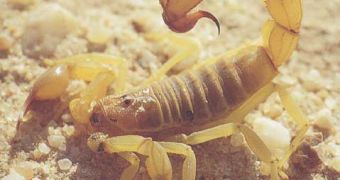We are damping in the environment tonnes of poison (read pesticides) that finally accumulate in the water, soil and air, envenoming us directly through food, drunk water and breathed air, not to mention that all the species suffer. The ecological agriculture tries to eliminate these poisons and one way to keep off pests without pesticides is by using their pathogens bacteria and fungi, which do not harm the environment.
A new research, published in the journal Nature Biotechnology and led by University of Maryland entomology professor Raymond St. Leger, has created a super insect-killer fungus by inserting in its genome scorpion genes encoding for venom. The fungus Metarhizium anisopliae received the scorpion neutoxin AaIT coming from Androctonus australis, one of the deadliest scorpion species for humans, encountered in Sahara.
"Scorpions have toxins that are superbly adapted to killing insects. A scorpion kills by stabbing its prey, so we were looking for a way to get the toxin into the insect without the scorpion. Fungi are really good at that because they are naturally infective. They land on the insect's outer surface, insert little tubes called hyphae, and grow within the insect. You could almost see them as tiny hypodermic needles. If you can get the fungus to insert a toxin into the insect, you can kill the insect very quickly. This is what we did.", said St. Leger.
M. anisopliae and related species are used in combating agricultural pests and mosquitoes, but their effectiveness is much lower than that of the synthetic pesticides. In Australia, this fungus is sprayed from airplanes for killing crop attacking locusts and grasshoppers. In African dwellings, sheets with spores of M. anisopliae are hung inside houses against mosquitoes.
"The problem is it takes quite a few fungal spores to kill the mosquito, and it is slow. It reduces the number of mosquito bites that people get, but it doesn't keep people from getting malaria or dengue. We're trying to get a supercharged, hypervirulent fungus that will take out the mosquitoes quickly." said St. Leger.
The new fungus could also be effective against coffee berry borer, a beetle causing huge losses in organic coffee crops in tropical Americas, in an industry ranking the second after oil as the largest legally traded item in the world.
Besides inserting the scorpion gene into the fungus DNA, the team also introduced a control gene so that the fungus will synthesize the scorpion venom only in the blood of the insect. Tests revealed the new fungus was 9 times more powerful than the normal M. anisopliae in killing mosquitoes, 22 times against caterpillars, and 30 times against the coffee borer beetle.
"This supercharged, pathogenic fungus has great potential to become a cost effective biopesticide that can kill using far fewer spores than the wild M. anisopliae fungus", said St. Leger.

 14 DAY TRIAL //
14 DAY TRIAL //